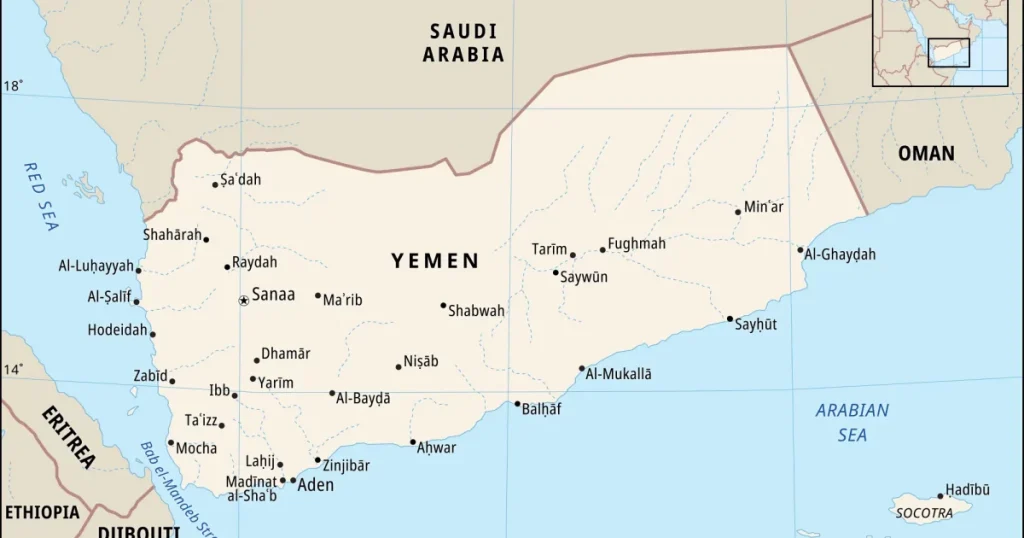The ongoing conflict in Yemen took a grim turn on Wednesday as Houthi rebels reported four fatalities following overnight airstrikes in the Hodeida province. The Houthi-controlled health ministry attributed the casualties to an attack on the Water Management building, holding the United States responsible. This incident marks an escalation in tensions, with Houthi media outlets reporting further strikes on rebel-held infrastructure in Hodeida, Hajjah, and the group’s northern stronghold of Saada. While the US has yet to officially confirm its involvement, these reported strikes align with President Trump’s stated commitment to continuing operations against the Houthis until they cease posing a threat to maritime navigation. This incident underscores the complexities of the Yemeni conflict and the potential for further escalation.
The reported US airstrikes and the Houthi response come amid a backdrop of heightened military activity in the region. Shortly after the reported strikes, Houthi military spokesman Yahya Saree announced their third alleged attack on the USS Harry S. Truman within a 24-hour period. This claim coincided with the Pentagon’s announcement of deploying a second aircraft carrier, the USS Carl Vinson, to the Middle East, joining the USS Harry S. Truman. The Pentagon emphasized that this move aimed to reinforce regional stability, deter aggression, and safeguard commercial shipping routes. The deployment of two aircraft carriers signals a significant increase in US military presence in the region, potentially escalating tensions further. The Houthis’ claims of targeting the USS Harry S. Truman, if verified, represent a bold challenge to US naval power and further complicate the delicate situation.
Since the US launched its campaign against the Houthis on March 15th, targeting their alleged threats to shipping, Houthi-controlled territories in Yemen have experienced almost daily attacks attributed to the United States. The Houthis have also claimed responsibility for attacks on US military vessels and Israeli targets. While the White House has touted the success of over 200 strikes against the Houthi rebels, the escalating cycle of attacks and counter-attacks risks further destabilizing the region and deepening the humanitarian crisis in Yemen. The Houthis justify their actions as expressions of solidarity with the Palestinians, particularly in response to Israel’s aid blockade on Gaza.
The Houthis’ actions, including targeting commercial vessels in the Red Sea and the Gulf of Aden, as well as Israeli territory, began shortly after the outbreak of the Gaza war in October 2023 and continued until a ceasefire in January. Their attacks significantly disrupted vital shipping routes, which typically handle a substantial portion of global trade, forcing many companies to adopt costly alternative routes around southern Africa. The resumption of US strikes followed Houthi threats to renew attacks on vessels due to the stalled truce talks and the continued blockade of Gaza. This intricate web of interconnected conflicts further complicates the situation, highlighting the broader regional implications of the Yemeni crisis.
The current escalation of tensions underscores the intricate dynamics at play in the region. The Houthis, backed by Iran, view themselves as defenders of Yemen against external aggression, while the US and its allies accuse them of destabilizing the region and posing a threat to international shipping. The targeting of commercial vessels raises serious concerns about the security of vital maritime trade routes, potentially impacting global supply chains and energy markets. The continued blockade of Gaza further exacerbates the humanitarian crisis in the Palestinian territories, fueling tensions and increasing the risk of further conflict.
The ongoing conflict in Yemen continues to take a heavy toll on the civilian population, exacerbating what was already one of the world’s worst humanitarian crises. The reported strikes on infrastructure in Hodeida, including the Water Management building, raise serious concerns about the impact on access to essential services for civilians. The international community must prioritize efforts to de-escalate the conflict and seek a peaceful resolution to the crisis. A comprehensive approach is needed, addressing the root causes of the conflict and ensuring humanitarian access to those in need. Without a concerted effort towards peace, the cycle of violence and suffering in Yemen is likely to continue, with far-reaching consequences for the region and beyond.














